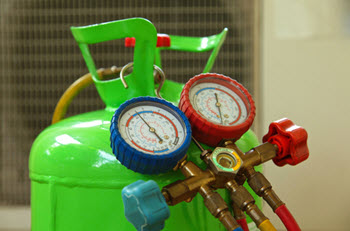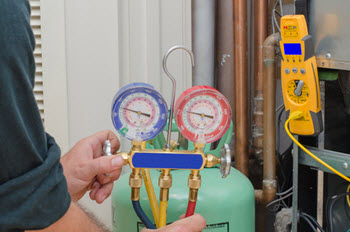 Refrigerant is an essential substance used in air conditioning, refrigeration, or freezing technology. You might have recently heard or read that a type of refrigerant, R-22, is being phased out, possibly piquing your interest on the topic. Regardless, seeing that your air conditioner uses refrigerant, it is always a good idea to know more about what it does.
Refrigerant is an essential substance used in air conditioning, refrigeration, or freezing technology. You might have recently heard or read that a type of refrigerant, R-22, is being phased out, possibly piquing your interest on the topic. Regardless, seeing that your air conditioner uses refrigerant, it is always a good idea to know more about what it does.
Many of us have had to deal with an AC refrigerant leak at some point. When this happens, you will need the services of a trusted HVAC company. Whenever you have any heating or air conditioning concerns, contact PFO Heating & Air Conditioning.
Our friendly HVAC technicians have the expertise and knowledge to provide top-quality service. Not only that, all of our services come at affordable prices. We offer repairs, installations, and maintenance. Schedule an appointment today. Call now!
Air Conditioner Repair West Windsor NJ Company Discusses The Importance Of An AC’s Refrigerant
Contents
Refrigerant, although often referred to its trademarked name, is the generic name for the cooling chemical blend that the refrigeration cycle uses. Without refrigerants, there would be no air conditioning and other cooling equipment.
What A Refrigerant Does
 Your A/C’s compressor houses the refrigerant that it uses. In the cooling cycle, the coolant turns into a high-pressure hot gas before it moves to the outdoor condenser coils. These coils are usually made of copper since copper is an excellent metal for heat transfer. Condensation forms as it moves across the coils and, as this happens, it releases the heat from the gaseous refrigerant. It then heads toward the indoor coil and moves through the expansion device. Here, its temperature drops to about 20 degrees and it returns to its liquid state.
Your A/C’s compressor houses the refrigerant that it uses. In the cooling cycle, the coolant turns into a high-pressure hot gas before it moves to the outdoor condenser coils. These coils are usually made of copper since copper is an excellent metal for heat transfer. Condensation forms as it moves across the coils and, as this happens, it releases the heat from the gaseous refrigerant. It then heads toward the indoor coil and moves through the expansion device. Here, its temperature drops to about 20 degrees and it returns to its liquid state.
The cold refrigerant passes through the evaporator coil as warm indoor air blows across the coils. The warm air evaporates, and this process warms the refrigerant and lowers the indoor temperature. The refrigerant returns to the compressor. Simply put, this continuous cycle moves cool air into your home while pushing hot air outside.
Throughout this cycle, the refrigerant remains at a set level, or what experts refer to as “charge.” No refrigerant is lost in this cycle. There is only one way that refrigerant loses its charge-leaking. If an AC is leaking coolant, this is a severe problem, and it needs to be repaired right away by a professional HVAC technician. An issue like this affects your home’s thermal comfort and it can lead to severe damages in your A/C as well.
Types Of Refrigerants
 The HVAC industry has used a few types of refrigerants over the years. The three most common are listed below.
The HVAC industry has used a few types of refrigerants over the years. The three most common are listed below.
Chlorofluorocarbons (CFCs)
These refrigerants contain chlorine, fluorine, and carbon. CFCs include R-11, R-12, and R-13, to name a few. Their development occurred in the 1930s, and their primary use was for industrial, commercial, and household applications. However, scientists discovered that the chlorine atom in CFC contributed to the greenhouse gas effect. This negative effect caused the government, through the Montreal Protocol, to prohibit this substance in 1987.
Hydrochlorofluorocarbons (HCFCs)
These refrigerants contain hydrogen, chlorine, fluorine, and carbon. Some of the HCFCs include R-22, R-123, and R-123. Scientists created HFC as a substitute for CFC in the 1980s. Although it is less damaging to the ozone than CFC, the Environmental Protection Agency still mandated its phase-out in 2010 and ordered that R-22’s discontinuation in newer AC systems. By 2020, R-22 will no longer be in production.
Hydrofluorocarbons (HFCs)
These refrigerants contain hydrogen, fluorine, and carbon. Some of the HFCs include R-410A and R-134. Without the chlorine atom in the blend, these refrigerants are safer for the environment. ACs that use R-410A are more energy-efficient, cost-effective, and they increase indoor air quality.
How Often Do You Need To Replace Your Refrigerant
As discussed above, your AC should not lose any refrigerant in the cooling cycle. In theory, you should not need to replace your coolant at all. However, a couple of factors can cause your refrigerant to leak. If this happens, you need to get this fixed immediately. Even the EPA has rules in place that require a homeowner to repair an AC with a refrigerant leak within 30 days.
If your A/C is blowing warm air instead of cold air, then call your trusted HVAC contractor to check to see if there are any leaks. Only licensed HVAC technicians can purchase refrigerant, so it is best to leave any refrigerant-related problems up to them.
Importance Of Refrigerant
Without the refrigerant, our air conditioner won’t be able to provide us the cold air we need during the summer. Not only that, but it also helps keep our food fresh. It makes our lives a lot more comfortable and gives us the ability to live in the most extreme of climates. Overall, the refrigerant’s creation revolutionized the way we live our lives.
Conclusion
The refrigerant is the heart of your AC. It plays a crucial role. Therefore, it is essential to make sure that your AC is in tiptop shape to avoid refrigerant leaks and other cooling system problems. Contact your local and trusted HVAC contractor by searching for “air conditioner repair near me” whenever you have any heating and cooling concerns.
For reliable HVAC contractors and heating and air conditioning services, call PFO Heating & Air Conditioning. We offer a wide range of expert HVAC services such as air conditioning tune-ups, installations, and repairs. Our team of NATE certified technicians is equipped with years of hands-on experience, training, and knowledge to resolve any HVAC issues you might have. We charge honest prices for all of our services including our air conditioner repair costs. You can count on us to provide you with fast, clean, and professional services. Call us to schedule a free estimate.
Some of the areas we service include Kingston, Plainsboro, Princeton, Princeton Junction, and these zip codes: 08528, 08536, 08540, 08550 as well as all surrounding areas in West Windsor Township, New Jersey.
Contact us now at (800) 253-9001 to find out more!



